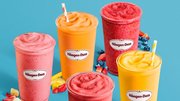Article
Fast casuals rise to meet healthy demands
Low-calorie menu items and online nutritional programs help consumers make healthier dining out decisions.

March 14, 2010 by Cary Stemle — Free-lance reporter, N/A
Since the start of January, numerous fast casual chains have added lower-calorie menu items and increased their emphasis on healthier ingredients.
Dallas-based Greenz has launched a multi-faceted wellness program while Tropical Smoothie Cafe has gone as far as hiring a registered dietician. Meanwhile, Einstein Bros. Bagels has added several low-calorie items to its permanent menu and struck an exclusive deal to sell Dannon's Activia yogurt.
Industry watchers say the reason for the trend is twofold: "I think it's a mix of consumer demand and menu labeling," said Margo Wootan, director of nutritional policy with the Center for Science in the Public Interest.
CSPI helped write a federal menu labeling law that is included in pending health-care legislation. Wootan said she believes the law will help consumers and restaurants. "It will at least allow people to make their own choices about how many calories they want to eat in a particular meal," she said. "And I think some of the biggest benefits will come from companies reformulating their menus."
Beyond labeling laws, there's also been a general heightened awareness of health issues. For example, First Lady Michelle Obama is leading the charge to take on the childhood obesity epidemic.
"More than ever, people are checking labels and asking about how to find the nutritional information or how to eat if they're on a special diet," said Casie Caldwell, president and co-founder of Dallas-based Greenz. "We didn't see a whole lot of that six years ago. Then, it was, ‘Yes, I want to eat healthy.' Now, they are more specific about it."
| ||||||||||||||||||
The wellness program at Greenz is built around a four-part plan that includes a menu guide for people with specific concerns, a new line of 400-calorie meals, an online nutritional calculator that helps people build their own meals and a new school-lunch program for private schools without cafeterias.
Greenz's wellness push began about four years ago when it partnered with Medical City Dallas, which provided a nutritionist to analyze its menu and identify heart-healthy items. Caldwell recommends that approach.
"We get a big bang for our buck," she said. "If I was a start-up like we were, I'd look for who I can partner with. Is there a heart hospital near you? There are movements — for example, the American Heart Association's ‘Go Red' campaign. Can you get involved with folks like that who could do a partnership or trade?"
Healthy emphasis
Tropical Smoothie Cafe also wants to be the restaurant of choice for consumers looking to eat healthier, said vice president of Marketing and Communications Barbara Valentino.
To that end, it recently hired a full-time dietician who provides expert advice both internally and externally. The company has an online nutritional calculator, and it ran a "Healthy Lifestyles" promotion in early 2010 that emphasized lower-calorie smoothies and flatbread sandwiches, and included a partnership with EA Sports Active, the top interactive fitness product for Wii.
Tropical Smoothie Cafe also partnered with the Highbush Blueberry Council to promote the benefits of the fruit, and currently has a promotion touting the benefits of eating breakfast.
Wootan, of CSPI, lauded this new emphasis on nutrition, though she noted there are still far more unhealthy options available in restaurants, not to mention outrageous portion sizes. She believes restaurant companies may actually benefit from mandatory menu labeling because they'll better understand what's in their own food.
Menu labeling legislation has prompted industry leader Panera Bread to voluntarily add calorie counts to menu boards at all corporate-owned locations by April. The company expects franchised locations to follow suit by the end of the year.
Cosi also was persuaded to change some of its menu items — such as less peanut butter on its children's PBJ sandwiches, and less cheese on its signature salad — because of pending legislation.
"They hadn't looked at the numbers and played with their recipes to see how they could keep the taste but cut calories," Wooten said. "Some restaurants don't know how many calories are in their items."
While Greenz makes its nutritional information easily accessible, Caldwell said she's wary of the logistics of mandatory labeling and believes the move to post nutritional content should be voluntary.
"Values can change based on products you get in," she said. "One week a vendor may short you on mayonnaise, and you have to replace it and change the value slightly. It becomes a lot to keep up with if the government forces your hand. I think (labeling is) absolutely a good thing to do, but I'd rather see it be a business decision."
Related Media
Food & BeveragePresented ByOracle
Presented ByOracle
 ChatGPT
ChatGPT Grok
Grok Perplexity
Perplexity Claude
Claude













